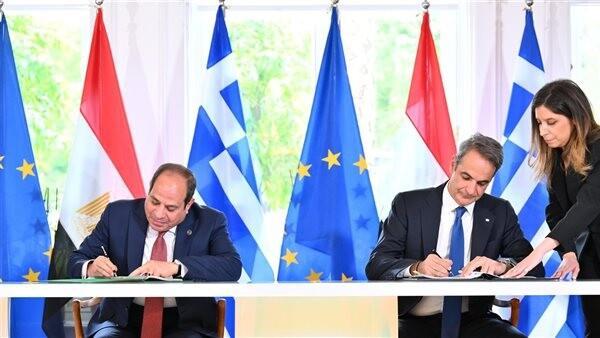President Abdel Fattah El-Sisi and Greek Prime Minister Kyriakos Mitsotakis signed a Strategic Partnership Declaration, marking a watershed moment in bilateral relations. The declaration was inked during El-Sisi’s official visit to Athens, which also featured the launch of the High-Level Cooperation Council and the signing of multiple bilateral agreements spanning energy, trade, labour, and regional security.
“This declaration initiates a new era of comprehensive partnership,” El-Sisi stated during a joint press conference, emphasizing Egypt’s deepening alignment with Greece as a reliable ally in an increasingly unstable region.
At the heart of this partnership lies the GREGY interconnection project, an ambitious plan to transmit clean, renewable Egyptian electricity—primarily from solar and wind—directly to European grids via Greece.
“This isn’t merely a bilateral infrastructure initiative. It’s a regional pivot with global implications,” El-Sisi said, calling on the EU to expedite support for the project, which has been classified as a Project of Mutual Interest by Brussels.
Greek PM Mitsotakis added: “The GREGY project will transform Greece into an energy bridge between Africa and Europe, securing supply diversification while enhancing Egypt’s role as a green energy powerhouse.”
According to Dr. Iman Rashed, a Cairo-based energy policy analyst, “This project positions Egypt at the crossroads of two global transitions—decarbonization and energy rebalancing post-Russia. It could bring billions in FDI and make Egypt the EU’s primary clean power supplier by 2030.”
In an exclusive development, MEO has learned from presidential sources that feasibility studies for a second power line are already underway, potentially linking Egypt not just to Greece, but to Bulgaria and the Western Balkans, creating a regional grid for renewable trade.
Beyond energy, the two countries inked agreements on seasonal labour migration, entrepreneurship, digital innovation, and infrastructure development. El-Sisi confirmed the fast-tracking of legal frameworks to allow more Egyptian workers into Greece’s agricultural and construction sectors—a key priority amid Greece’s demographic and labour shortages.
“The Egyptian-Greek labour mobility agreement could serve as a blueprint for regulated migration in the Mediterranean,” noted Dr. Alexandros Kouris, a migration economist at the University of Athens.
In their inaugural High-Level Cooperation Council session, El-Sisi and Mitsotakis also reviewed progress in maritime security, transport logistics, industrial manufacturing, and education partnerships.
Both leaders addressed pressing geopolitical concerns—from Gaza and Red Sea instability to broader Mediterranean security. They called for an immediate ceasefire in Gaza, emphasized the two-state solution as the only path to peace, and condemned attempts to forcibly displace Palestinians.
El-Sisi said: “We completely reject the use of starvation and denial of medical services as weapons. The humanitarian catastrophe in Gaza must end.” Mitsotakis praised Egypt’s pivotal mediation efforts and supported Cairo’s post-war early recovery and reconstruction initiative for Gaza.
Discussions also covered Libya, Syria, Sudan, and navigational security in the Red Sea, with Mitsotakis proposing a dedicated UN Security Council session on maritime threats, particularly in light of Suez Canal vulnerabilities.
Addressing recent rumours about Saint Catherine’s Monastery, El-Sisi reaffirmed Egypt’s commitment to religious freedom, citing the reconstruction of 65 churches and declaring: “If there were Jewish citizens in Egypt, we’d build synagogues for them too.”
In a symbolic move, El-Sisi’s message was aimed not only at diffusing concerns in Greece, but also at reinforcing Egypt’s image as a tolerant, multicultural state—key to its strategic partnerships in Europe and beyond.
For Egyptian businesses, the strategic pact offers a window into EU markets through Greek gateways. The agreements support port infrastructure, technology exchange, and legal mechanisms for joint ventures.
In a side meeting with Dimitrios Copelouzos, CEO of Copelouzos Group (Greece’s key energy conglomerate), El-Sisi discussed fast-tracking the Egypt-Greece power corridor and expanding Egypt’s capacity in solar and wind energy production.
“This isn’t just about energy exports—it’s about anchoring Egypt as a regional platform for renewable innovation and value-added manufacturing,” said Omar Younes, director of MENA Energy Strategies at the London School of Economics.
